Text
Ancient Greek Religion & Hellenic Polytheism: A Reading Guide

I’ve been wanting to make something like this for a long while, and talking to my friend @olympianbutch today gave me the push I needed to do so. When I was starting out as a Hellenic Polytheist years ago, this is the kind of resource I needed. So I hope you all enjoy and find this helpful!
Introductory Reading:
Ancient Greek Religion by Jon D. Mikalson
Athenian Popular Religion by Jon D. Mikalson
Greek Religion by Jan N. Bremmer
On Greek Religion by Robert Parker
Hellenic Polytheism: Household Worship by LABRYS
Comprehensive Guides:
Greek Religion by Walter Burkert
Companion to Greek Religion edited by Daniel Ogden
Understanding Greek Religion by Jennifer Larson
Rethinking Greek Religion by Julia Klindt
The Oxford Handbook of Ancient Greek Religion edited by Esther Eidinow and Julia Klindt
Polytheism and Society by Robert Parker
The Gods and Theology:
Ancient Greek Cults by Jennifer Larson
Theologies of Ancient Greek Religion edited by Esther Eidinow, Julia Klindt, and Robin Osborne
Underworld Gods in Ancient Greek Religion by Ellie Mackin Roberts
Gods and Heroes of the Ancient World (Routledge Series)
Offerings and Sacrifice:
Personal Experience and Materiality in Greek Religion by K.A. Rask
Singing for the Gods by Barbara Kowalzig
Smoke Signals for the Gods by F.S. Maiden
Sharing with the Gods by Theodora Suk Fong Jim
Primary Sources:
Theogony & Works and Days by Hesiod
The Homeric Hymns
The Orphic Hymns
Sources for the Study of Greek Religion by David Rice and John Stambaugh
Greek Religion: A Sourcebook by Valerie M. Warrior
Ancient Greek Religion: A Sourcebook by Emily Kearns
2K notes
·
View notes
Text

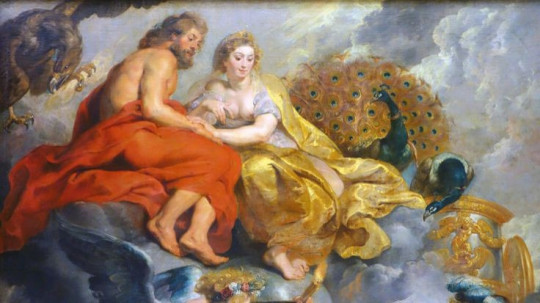
The beauty of Zeus and Hera's love.
praised be the chief couple of Olympus, king and queen of the Gods, those who reign in the heavens and bless the earth. I call upon the grace of Zeus and Hera and beg that my life be as beautiful and pure as the love of the Gods who sit beneath the golden thrones of Olympus.
220 notes
·
View notes
Text
A guide to worship of Ares - cheat sheets


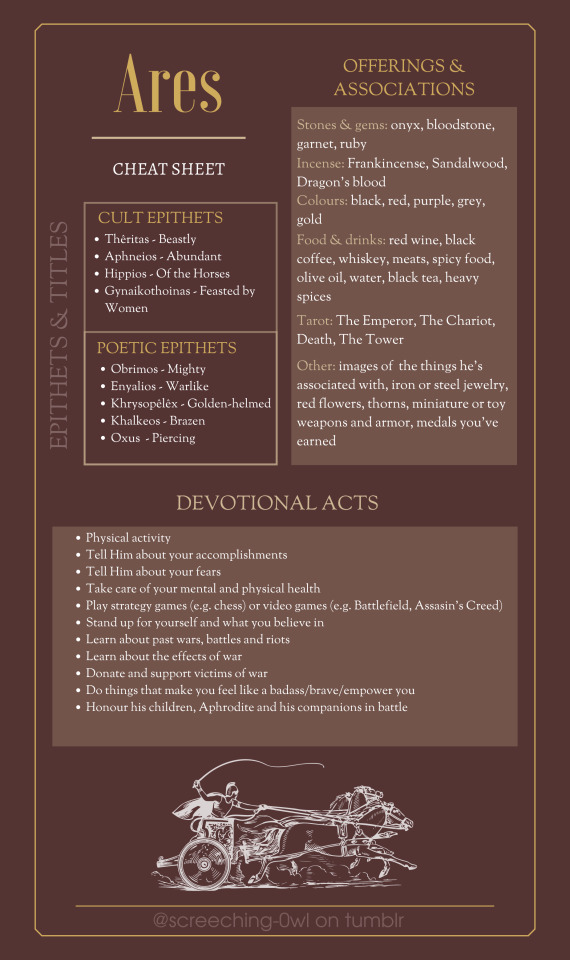

Hellenic cheat sheets
If you like my content consider supporting me on: https://ko-fi.com/screeching0wlet
2K notes
·
View notes
Text
Skip Google for Research
As Google has worked to overtake the internet, its search algorithm has not just gotten worse. It has been designed to prioritize advertisers and popular pages often times excluding pages and content that better matches your search terms
As a writer in need of information for my stories, I find this unacceptable. As a proponent of availability of information so the populace can actually educate itself, it is unforgivable.
Below is a concise list of useful research sites compiled by Edward Clark over on Facebook. I was familiar with some, but not all of these.
⁂
Google is so powerful that it “hides” other search systems from us. We just don’t know the existence of most of them. Meanwhile, there are still a huge number of excellent searchers in the world who specialize in books, science, other smart information. Keep a list of sites you never heard of.
www.refseek.com - Academic Resource Search. More than a billion sources: encyclopedia, monographies, magazines.
www.worldcat.org - a search for the contents of 20 thousand worldwide libraries. Find out where lies the nearest rare book you need.
https://link.springer.com - access to more than 10 million scientific documents: books, articles, research protocols.
www.bioline.org.br is a library of scientific bioscience journals published in developing countries.
http://repec.org - volunteers from 102 countries have collected almost 4 million publications on economics and related science.
www.science.gov is an American state search engine on 2200+ scientific sites. More than 200 million articles are indexed.
www.pdfdrive.com is the largest website for free download of books in PDF format. Claiming over 225 million names.
www.base-search.net is one of the most powerful researches on academic studies texts. More than 100 million scientific documents, 70% of them are free
303K notes
·
View notes
Text
Not enough people associate Zeus with dance—specifically war dances.
During his infancy, Zeus was surrounded by the war dance of the Kouretes, and in his adulthood, he's described as shaking his aegis: an action which isn't awfully dissimilar to the choreography of dancing warriors.
442 notes
·
View notes
Text
To my Fellow Trans/Non-Binary Polytheists:
You have every right to be scared right now.
I’m seeing so many people saying and posting sentiments along the lines of “being afraid is how they win! Fight back!” - which is fine in theory but INCREDIBLY unhealthy in practice.
You are allowed to have feelings
. If you’re scared, worried, angry, sad, numb - please let yourself feel your emotions.
You don’t have to succumb to hopelessness - you don’t have to let your emotions paralyze you for the next four years - but you can fight despair while also allowing yourself to feel what you are feeling.
And (this might be controversial but I feel the need to say it) - do not expect prayer to The Gods to fix this, because it won’t.
We must embody The Gods - embody the rightful wrath of Ares, the cunning planning of Athena, the joyous rebellion of Dionysus, and the nurturing graces of Hestia.
The Gods can work through us, but they cannot change this world without human hands.
The Temple of Hyacinthus may be small, but it is here for you. Here for you to find art, hymns, prayers, and myth - it is also here for knowledge and guidance if that’s what you seek (our asks are always open).
Please keep living - keep fighting, even if fighting just means waking up everyday to see the Sun.
Eirene - peace and farewell,
- The Temple of Hyacinthus & Aön Re
121 notes
·
View notes
Text
"...and everywhere, all of us have need of Zeus."
Aratus - Phaenomena
356 notes
·
View notes
Note
Something which has concerned me as of late is the rather strenuous expectations the Hellenic community as a whole has about miasma, khernips and katharmos - namely, it seems like the expectation is that lustral water needs to be used EVERY time someone conducts household worship. Could you shed some light on this?
Oh boy, this is a big can of worms you’re handing me - but one I’ll open up with pleasure, because I’ve been thinking about it a lot lately.
Before I begin, I should clarify a couple of things:
as we all know, Ancient Greek religious practise varied from region to region and city to city, and the information we have about many places (especially rural) is limited. For all we’re aware, villagers in Euboea may just have purified themselves by throwing salt at each other. Thracian farmers might’ve done it via an equivalent of the Ice Bucket Challenge. Who knows? I’m exaggerating a bit, but the bottom line is that just because it isn’t attested doesn’t mean it didn’t happen somewhere.
in my opinion, if something works for you and isn’t disrespectful to the Gods, it isn’t a bad thing. I’d rather see happy, genuine, non-historical worship than no worship at all.
I myself am a reconstructionist. Historical continuity matters to me. While I’m aware that we can’t know everything, and that our understanding is constantly evolving alongside academic research, I want my practise to be well-rooted in the past wherever possible. As such, I consider it very important that people with beliefs similar to mine understand Ancient Greek practise as best we can, before we adapt it to suit our modern world.
I’m still learning about this subject. I’m fairly sure the information below is accurate, but if I make any mistakes, please let me know!
That said, let’s move on to the fact that many Hellenic polytheists’ interpretation of pollution and purification is, historically, pretty wrong.
We do know that purification before prayer or ritual is important. Ancient texts are clear on this: the Iliad and Odyssey, among many other works, repeatedly show people washing their hands before approaching the Gods (Il. 9.171-172, 16.227-230). It seems that this was most basic and essential act for any type of ritual. At its bones, it was a way of keeping clean before something important, like washing our hands before dinner - in fact, hand-washing before dinner was done in exactly the same way as for ritual (Od. 1.146). The most common description, χεῖρας νίψειν, simply means ‘to wash one’s hands’.
But something modern Hellenic polytheism seems to have lost is the large variety of religious terms used to describe pollution and purification. Not all kinds of purification were the same. Some were done with simple running water, like the examples above. Others feature what modern Hellenic polytheists call lustral water, or khernips (χέρνιψ) - fire extinguished in pure water. (Yet others include torches, barley groats and other purifying agents, which we’ll leave aside for the purpose of this post.) The point is: all of this is lustral water, but not all of it is khernips, and not all of it was necessary for everyday worship.
Let’s take a side-step through the question of miasma and katharmos. These are two highly specific religious terms which are unfortunately often narrowed down to ‘dirty’ and ‘clean’. Miasma (μίασμα), in fact, refers to a metaphorical stain caused by impious behaviour: that is, murder, incest, adultery, sacrilege, and other severe crimes. Jean Rudhardt describes it as ‘a bloodstain, a defilement attached to the hands of those who did dirty work’ and ‘the fears of a guilty conscience’. Miasma affects its surroundings, which is why criminals were exiled and banned from communal rites. Specific purification rites were required, and in fact, this often included the criminal’s exclusion from lustral water until their crime was expiated.
Miasma is a bad thing. Average people did not and do not have it. Let me say this again: you do not have miasma. If you do have miasma, please turn yourself into your local police station today.
What you probably do have is lyma (λῦμα), literally ‘the thing you wash away’. This is pollution caused by common occurrences like birth, death, and sex. You incur it through your everyday life, sometimes knowingly, sometimes not - like by walking past places where people have recently died, or by coming into contact with people who have recently had sex. Lyma is also caused by rightful death, like the execution of a criminal, or killing people on a battlefield. Lyma is not a bad thing.
This is what you wash away with clean, running water before interacting with the Gods. Βy doing this, and by being hosios (ὅσιος, another specific religious term for following the right order of things, conform to the laws which regulate acceptable behaviour towards other humans and Gods), you become katharos (καθαρός, pure). This is your natural, human purity.
Did you hear that? Religiously, humans are naturally pure. We need cleansing because of what we do and what happens around us, not because we’re inherently ‘dirty’ in the Gods’ eyes.
Back to purification. By now I’ve established that there’s two types - expiatory rites for miasma, which often prevent you from taking part in religious ceremonies, and clean, running lustral water to wash away your everyday lyma. However, there’s a third type, and this type is khernips.
Khernips literally means ‘handwash’. You can still see this meaning in use in the Odyssey, in the often reused lines χέρνιβα δ’ ἀμφίπολος προχόῳ ἐπέχευε φέρουσα / καλῇ χρυσείῃ ὑπὲρ ἀργυρέοιο λέβητος / νίψασθαι: ‘then a handmaid brought khernips in a beautiful golden pitcher and poured it over a basin, so he could wash’ (Od. 1.136-138, 4.52-54, 7.172-174, etc). But its meaning in Classical Greek religion is very specific: it refers to lustral water in which a burning brand is extinguished, sprinkled on the altar and participants before a major communal sacrifice (θυσία, thusia). This water was sacred, and unclean people were not permitted to touch it. According to Jean Rudhardt, this is because khernips was not simply meant to purify you. It was meant to consecrate you - to bring you into that sacred state necessary for important rites.
The bottom line of all this? There are different types of lustral water, just like there are different types of pollution, and not all apply to everyday household worship. While I firmly believe that purification before prayer and ritual is vital, I don’t think we need to do much more than wash our hands. Like I said at the beginning, if the whole extinguishing-fire-in-water thing works well for you, great - and for all we know, maybe it was common in some parts of Ancient Greece! Ancient Greek religion and religious terms are a very complex subject (despite the length of this post, I actually had to gloss over a number of finer points I’m not qualified to discuss) and it’s absolutely possible that we’re missing out on something. But as of now, this is what we know, and as a reconstructionist, it’s what I choose to draw from.
Lastly, if you’re interested in reading more about the subject, I recommend Jean Rudhardt’s Notions fondamentales de la pensée religieuse et actes constitutifs du culte dans la Grèce classique (unfortunately, I’m not sure if you can find it in English?), as well as Robert Parker’s Miasma: Pollution and Purification in early Greek Religion. Lesley Maditinou, a Hellenic reconstructionist, also wrote a thorough and accurate article about the subject here.
I will now close this can of worms, but I hope I was successful in sorting through some of it :)
2K notes
·
View notes
Text

awesome meme from the mythologymemes community 💙
623 notes
·
View notes
Note
for uhm personal reasons I need to know all about feminine apollo so please tell me more
Aha, that's something I love to talk about. I was about to make a post about this anyway so: There's a lot of ancient greek vase paintings that show Apollo wearing feminine robes and accessories that were usually worn by women. For example,
a veil
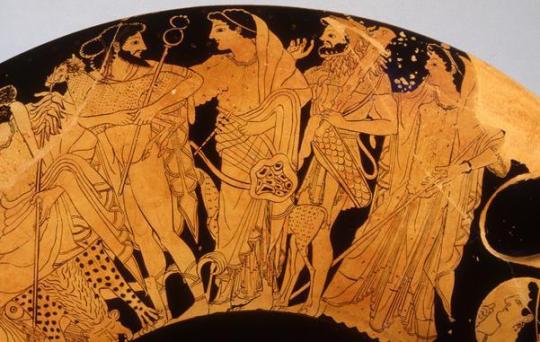
(Heracles ascending to Olympus)
Multi pinned sleeve
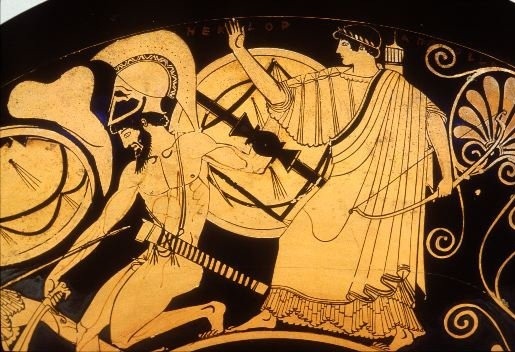
(Apollo helping Hector in the Trojan war)
Cross sash

(The musical contest between Apollo and Marsyas)
Periskelis (the thigh band)
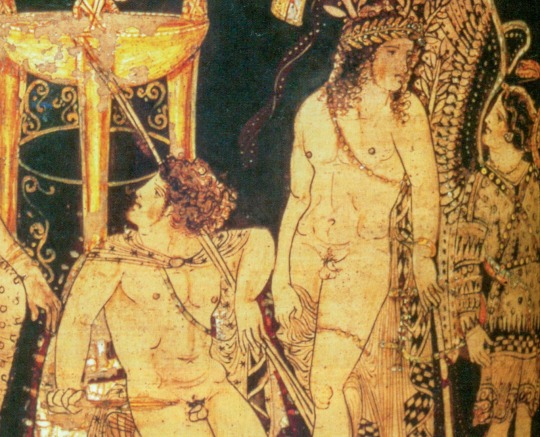
(Orestes seeking shelter at Delphi)
Here, he is wearing the chiton in a way that girls wore
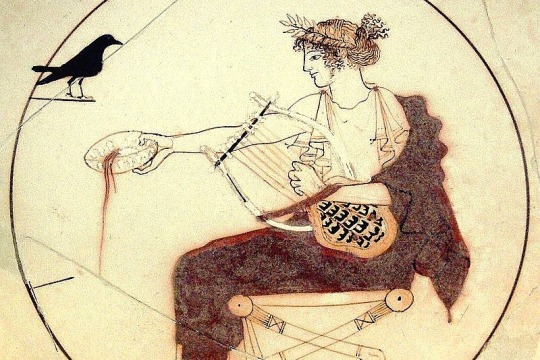
And these lithographs of ancient art have him wear such pretty dresses
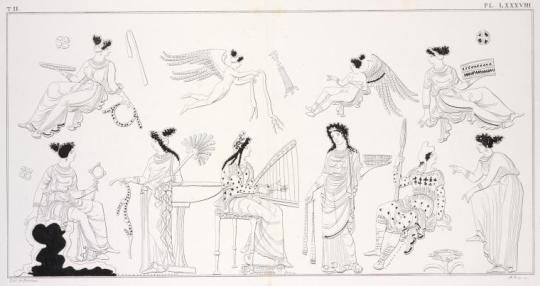
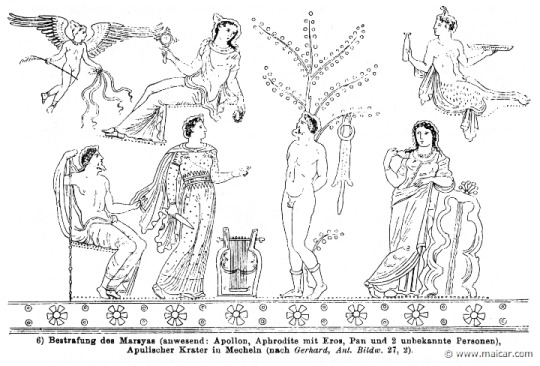
Since he is an eternal youth, 99% of the times he has long hair and youthful face - those are the very important physical traits of Apollo. There are many paintings where you will confuse Apollo for a girl.
Apart from these, I have found quite a few statues and marble reliefs too. Many of these are from Hellenistic Greece and Roman era:


As you can notice, most of these present Apollo as a musician, so maybe music played a part in Apollo being effeminte? Did the Muses have a lot of influence on him?Idk, food for thought I guess. Oh and there are a number of headless statues identified as Apollo Patroos (fatherly), where again Apollo is wearing long robes.
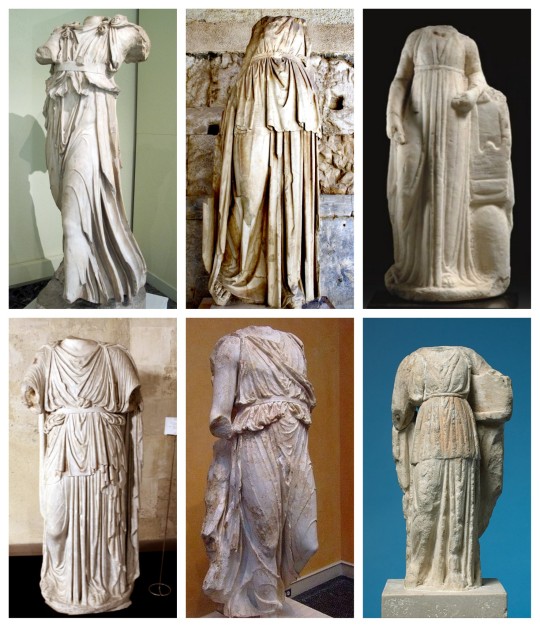
Lastly, some quotes from literary sources (FYI I have not included the hundreds of quotes describing Apollo's long hair and smooth chin):
"And ever beautiful is he and ever young: never on the girl cheeks of Apollo hath come so much as the down of manhood."
- Callimachus, Hymn to Artemis (trans. Mair) (Greek poet C3rd B.C.)
"Apollo puts his hair in order by shaping his flowing locks with soft foliage and braiding it with a golden diadem."
- Virgil, Aeneid 4.147 (trans. Ingo Gildenhard) (Latin poet C1st B.C.)
"These children Niobe placed above those of Latona [Leto], and spoke rather contemptuously against Apollo and Diana [Artemis] because Diana was girt in man's attire, and Apollo wore long hair and a woman's gown."
- Hyginus, Fabulae 9 (trans. Grant) (Roman mythographer C2nd A.D.)
[describing an effeminate man]: giving himself excessive airs of daintiness and indulging in all sorts of effeminacy; sometimes darting his eyes about; sometimes throwing his hands hither and thither...sometimes personating Aphrodite, sometimes Apollo"
- Tatian, Address to the Greeks 22 (trans. Pratten) (Assyrian Theologist C2nd A.D)
"[in the fragments of Lucilius' satires (C2nd B.C)]: Taking issue with Apollo, whom Romulus mocks as a pretty boy (pulcher) with a fondness for effete dance, Romulus rants against foreign luxuries"
- The Cambridge Companion to Seneca (ed. Shadi Bartsch, Alessandro Schiesaro)
fair number of Renaissance paintings continued this tradition by making Apollo look feminine and beautiful. But for some reason most of the modern adaptations make him macho, the typical Manly Man 🙄 Come on people, you're throwing away the potential here! I wanna see an Apollo who can rock a suit and a pretty dress. Give me more of Apollo and Dionysus hanging out together at drag parties.
5K notes
·
View notes
Text
Common Terms in Helpol!
Hello there! So... Hellenic polytheism has a lot of words, and they can get confusing. It's hard to keep track of so many things! So I thought I would make a list of a whole bunch of common, or maybe not-so-common terms in Hellenic polytheism! Honestly, I really just wanted to make a really long informative post, so here you all go!
If there is any term you would like me to add to this list, let me know and I will gladly add it! Also, at the bottom of this post, I will link other posts where people have done an absolutely amazing job going into detail about one or more of these terms, or maybe others I chose not to include in this list!
Hellenic/Hellenismos/Hellenistic/Helpol
If you’re on helpol tumblr, or really any helpol-focused social media, you’ve heard all of these terms, and you may be wondering… which is the right term for the religion?
Hellenic: of or relating to Greece, its people, or its language specifically: of or relating to ancient Greek history, culture, or art before the Hellenistic period (Merriam-Webster). Basically, Hellenic means Greek.
Hellenism: devotion to or imitation of ancient Greek thought, customs, or styles; Greek civilization especially as modified in the Hellenistic period by influences from southwestern Asia; a body of humanistic and classical ideals associated with ancient Greece and including reason, the pursuit of knowledge and the arts, moderation, civic responsibility, and bodily development (Merriam-Webster). Basically, Hellenism means relating to Greek culture.
Hellenismos: Hellenism, but closer to what the word is in Greek, to my understanding.
Hellenistic: of or relating to Greek history, culture, or art after Alexander the Great (Merriam-Webster) The Hellenistic Period refers to 323-31 BCE, from the death of Alexander the Great to the rise of Augustus in Rome.
Hellenic Polytheism (Helpol): Hellenic polytheism, which would literally mean "The worship of more than one Greek god" is generally thought to be the best term for the worship of Hellenic (Greek) gods. And in my opinion, it makes the most sense!
Theoi
Theoi is the ancient Greek word for the Gods. There are many "Types" (sort of) of Theoi, including Theoi Einalioi, Theoi Georgikoi, Theoi Gamelioi, Theoi Kthonioi, Theoi Ouranioi, Theoi Olympioi, Theoi Nomioi, and the Theoi Titanes (Theoi.com) Most commonly mentioned of these "types" of the theoi are Ouranic and Kthonic. Many (if not most or all) gods fit in to more than one of these categories, for example, Lady Aphrodite is part of the Theoi Einalioi (Sea), Theoi Gamelioi (Marriage), Theoi Ouranioi (Sky), and Theoi Olympioi (Olympian).
Ouranic: The Theoi Ouranioi, or Ouranic deities are the gods of the sky. Offerings to Ouranic deities can be eaten, and when praying, palms are traditionally facing up.
Kthonic: The Theoi Kthonioi, or Kthonic deities are the gods of the earth and underworld. Offerings shouldn’t be eaten and when praying, hands are typically down towards the ground.
Khaire/Xaire
Khaire, chaire, or xaire (Greek: χαίρε) Is a Greek greeting, meaning “hello”, “hail”, “rejoice”, “goodbye”, or “farewell”. However, to my understanding it is not used in modern Greek, though it’s plural, χαίρετε, is occasionally used in formal settings.
I have personally seen many helpols use the spelling “khaire” as a greeting, while the spelling “xaire” to mean hail or rejoice. As far as I can tell, this is just their personal preference.
Purification
Miasma: “Stain”, “Defilement”, “Pollution”. Miasma refers to being extremely ritually impure, and one who is miasmic should not approach the Gods. However, you likely do not have miasma. Miasma comes from murder, incest, assault, and other extremely serious crimes. Miasma affects its surroundings, and can make the area around it also impure. Without the proper purification, miasmic individuals should not approach the Gods.
Lyma: “dirt”. Lyma is impurity one naturally picks up from the world around them. Humans are not naturally impure, but they can pick up lyma on a normal day to day basis. Examples of lyma include being around/giving birth, blood, being around death/the dead, literal dirt, etc. Having lyma is not necessarily a bad thing, but it’s best to wash it away (most people in modern day and in ancient Greece to my knowledge simply wash their hands in running water) before approaching the Gods, similar to washing your hands before dinner. It’s just more respectful.
Khernips: Khernips refers to a flame doused in water and is basically a fancy way of purification. Most of the time, you don’t need to use khernips to rid yourself of lyma, you can just use regular running water, but some prefer to use khernips all the time.
Kharis
Kharis at its most basic definition is a reciprocal relationship with the gods. This means not asking for things without giving anything in return, such as praying for big things without an offering to go with it. Kharis goes both ways, so if you give an offering, a god will often respond to your request.
Xenia
Xenia, meaning “guest-friendship” and “hospitality”, is often thought to be an important ideal in Hellenic Polytheism. Many take it to mean inclusivity and kindness to everyone, including strangers. In ancient Greece, xenia was thought to be important because there was always a chance that a guest could be a god in disguise.
Hubris
“exaggerated pride or self-confidence […] In classical Greek tragedy, hubris was often a fatal shortcoming that brought about the fall of the tragic hero. Typically, overconfidence led the hero to attempt to overstep the boundaries of human limitations and assume a godlike status, and the gods inevitably humbled the offender with a sharp reminder of their mortality.” - Merriam-Webster. Basically, hubris is putting oneself at the same or higher level than the Theoi.
Offerings
Offerings: Gifts to the gods. Common offerings include foods, art, music, trinkets that remind you of the god the offering is for, etc.
Libations: Liquid offerings to the gods. Libations can be poured on the ground or into a container. Common libations include wine and water (though I personally like to offer Diet Coke, but that’s just me)
Devotional Acts: Things done in honor of the gods. Often, these are used as a more subtle way of offering. An example of a devotional act would be for Lady Aphrodite, doing one’s skincare/makeup, or spending time with a loved one.
Patron
In modern helpol spaces, I often see the word patron used to mean a god one closely worships. However, in ancient Greece, a patron god was one who held dominion over certain aspects of your life, such as your job, hobbies, identity, or where you lived. For example, Lady Athena is the patron of Athens, and Lord Hermes is the patron of travelers and thieves.
Epithets
An epithet is “a descriptive term (word or phrase) accompanying or occurring in place of a name”, sometimes described as a nickname. Epithets often refer to qualities of the one they are given too, whether by appearance (ex. Bright-Eyed Athena), personality (ex. Zeus the Merciful), history (ex. Sea foam born Aphrodite), or actions (Swift-Footed Achilles). Gods and some heroes have epithets.
Reconstructionism/Revivalism
Reconstructionism and Revivalism are two different ways of practicing helpol (not specific to helpol, but I’m just talking about that here). When done respectfully, neither is wrong, nor better/worse than the other.
Reconstructionism: “Reconstructionism attempts to re-establish genuine polytheistic religions in the modern world through a rediscovery of the rituals, practices and contextual worldviews of pre-Christian pagan religions.” In other words, reconstructionists attempt to recreate the religious practices of ancient times as closely as possible (while usually modifying some things such as animal sacrifice that aren’t as acceptable nowadays).
Revivalism: Revivalism refers to those who practice in a more modern way, while still keeping in mind the ancient traditions. An example of something that a revivalist might do is a digital offering, something that would not have been possible in ancient Greece.
UPG, SPG, and VPG
Unverified Personal Gnosis: UPG refers to an experience, belief, or association with a deity that isn't backed up historically. UPGs are personal, and others may or may not agree with or share them.
Shared Personal Gnosis: SPG, also known as PVPG (Peer Verified Personal Gnosis), refers to experiences, beliefs, or associations shared by many worshippers of certain deities. Though they don't hold as much weight as beliefs backed up historically, they tend to hold more weight than UPGs.
Verified Personal Gnosis: VPG means that an experience, belief, or association someone has is backed up by historical sources.
Great Helpol Resources
These are mostly just some amazing other tumblr posts that have helped me a lot and also explain some of these terms in more detail/better than I have.
Xenia and UPG vs SPG vs VPG ~ @beautyofaphrodite (me)
Miasma, Lyma, and Khernips ~ @sisterofiris
Beginner’s Guide to Hellenic Polytheism ~ @wisdom-devotee
Ouranic, Kthonic, and Einalic ~ @pietyandpearls
Blogs such as @khaire-traveler and @atheneum-of-you are also amazing! khaire-traveler has some great subtle worship posts, and atheneum-of-you has some amazing and very well researched informative posts.
As always, if something I mentioned is wrong, weirdly worded, confusing, I missed something, etc, please please please let me know and I’ll do my best to fix it! Much love 🫶
189 notes
·
View notes
Text
I have to come to terms with the fact that most people's understanding of Greek religion (even in polytheist spaces) comes through the filter of Victorian-era compartmentalization.
Example: Ouranic vs. Chthonic
311 notes
·
View notes
Note
Can I worship Leto Phytie (the Grafter) as a protector and goddess of transgender people?
Leto the Grafter.
Called as much because she grafted a penis onto the body of Leucippus, who was born female.
It seems only natural that Leto Phytie should be reappropriated as a patron and protectress of trans people—tboys, especially.
43 notes
·
View notes
Text
Hades and his aid to heroes in greek myths
Out of all the gods in the greek pantheon, Haides has the strongest reputation for being closed off and uninvolved with humans. After all, he lives in the underworld and rarely, if ever, leaves his realm.
However, after thinking about greek mythology obsessively (as I always do), I realized that there is a pattern of Hades helping heroes/mortals. He doesn’t help them directly like Athena or Hermes do because he’s always in the underworld, but he does aid mortals even when there’s no obligation for him to do so. Here are some examples:
Hades lending his helmet of invisibility to Perseus so he can slay the gorgon
Pseudo-Apollodorus, Bibliotheca 2. 36 - 42 (trans. Aldrich) (Greek mythographer C2nd A.D.) :
“These Nymphai had in their possession winged sandals and the kibisis, which they say was a knapsack.--Pindaros and Hesiodos in the Shield of Herakles, describe Perseus as follows : ‘The head of a terrible monster, Gorgo, covered all his back, and a kibisis held it.’ It is called a kibisis because clothing and food are placed in it.--They also had the helmet of Haides. […] Perseus then placed the head in the kibisis and headed back again, as the Gorgones pursued him through the air. But the helmet kept him hidden, and made it impossible for them to identify him.”
Hades giving his hound to Heracles so he can fulfill his labors and letting him free his prisoners
Pseudo-Apollodorus, Bibliotheca 2. 125 (trans. Aldrich) (Greek mythographer C2nd A.D.) :
“Herakles asked Plouton (Pluton) [Haides] for Kerberos (Cerberus), and was told to take the hound if he could overpower it without using any of the weapons he had brought with him."”
Pseudo-Hyginus, Fabulae 79 (trans. Grant) (Roman mythographer C2nd A.D.) :
“When Hercules came to lead out the three-headed dog, they [Peirithoos and Theseus, trapped in the underworld] begged his promise of protection. He obtained the favor from Pluto [Haides], and brought them out unharmed.”
Hades and Persephone allowing Orpheus to leave the underworld with his deceased wife
Pseudo-Apollodorus, Bibliotheca 1. 14 (trans. Aldrich) (Greek mythographer C2nd A.D.) :
“When his [Orpheus'] wife Eurydike (Eurydice) died from a snake-bite, Orpheus descended into Haides' realm with the desire to bring her back up to earth, and persuade Plouton (Pluton) [Hades] to release her. Plouton promised to do this if on the return trip Orpheus would not turn round before reaching his own home. But he disobeyed, and turned to look at his wife, who thereupon went back down again.”
Ovid, Metamorphoses 10. 8 ff (trans. Melville) (Roman epic C1st B.C. to C1st A.D.) :
“[…] the queen [Persephone] and he whose sceptre rules the underworld could not deny the prayer, and called Eurydice.”
Hades and Persephone granting Odysseus’ wish
Homer, Odyssey 10. 135 ff (trans. Shewring) (Greek epic C8th B.C.) :
“Then I called to my comrades and bade them flay and burn the sheep that lay there slain with the pitiless bronze, and to make prayer to the gods, to mighty Hades and dread Persephone.” (Immediately after this, Hades and Persephone answer Odysseus’ prayer)
Bonus: Hades lends Hermes his helm of invisibility so he can protect himself while battling the giants
Pseudo-Apollodorus, Bibliotheca 1. 34 - 38 (trans. Aldrich) (Greek mythographer C2nd A.D.) :
“Hermes, who was wearing the helmet of Haides, killed Hippolytos in the course of the battle, and Artemis killed Aigaion (Aegaeon).”
My thoughts
So if Hades answers prayers, lets other gods and mortals borrow his most valuable weapon, and even breaks his own rules (no one can leave the underworld) to grant other people’s wishes, how can we call him closed off? From this pattern of behavior, it seems like he’s extremely caring and generous . We have to kill the myth that chthonic deities are unresponsive and apathetic.
Here’s an article about Hades’ worship for everyone who wants to keep reading about this topic
109 notes
·
View notes
Text
I always leave the store with something pomegranate in my hand.
21 notes
·
View notes
Text
another one of the most striking signs I received from a deity was a dream of meeting Hecate in a blockbusters parking lot at night. She gave me a message [which I won't share here as it was very personal]. She was surrounded by fog and hounds.
0 notes
